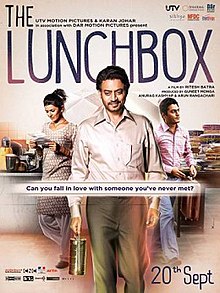
Talk
about Bollywood movies and the natural assumption is that there's a
few lines of plot to punctuate the extended song-and-dance that
Indian audiences seem to want in large doses, sweet as the
sugar-laden confections that spike the carbs at the end of an
otherwise mostly veg plate of Indian food—with curry. There has to
be curry: season to taste. Some like it hot. But 'The Lunchbox'
plays for subtlety; that means there are changes in the Indian market
or this movie is made for foreign audiences, or both. Stay tuned for
more...
Disclaimer:
I was so skeptical about a Bollywood movie romp, that I had to watch
this movie three times: the first mostly sleeping (note to self:
never start a movie at 9 p.m. on a day when I started work at 6 a.m.); the second confirming that, yes, there was a real movie here,
though still skeptical enough to leave the sound off while listening
to my favorite indie radio station; and the third—finally—actually
watching the movie with all its attendant details: plenty.
The
plot is simple, yet elegant: a frustrated housewife sends her
lunchbox off to her husband though the local Mumbai dabbawalla
system (which almost never fails) and through some quark (!) of
fate, it ends up in the wrong hands, with almost her exact conceptual
opposite in fact: a grumpy white-collar widower, who is very picky
about the food he puts in his mouth (they all are, apparently, women
living for no higher purpose in this world-view).
Well,
one thing leads to another and Saajan and Ila start a correspondence
by lunchbox which gradually grows and grows until... (cue
drum-roll)... nothing. Nothing happens. Ila plans to leave her
husband and run off with Saajan, but it doesn't happen. They weave
circles around each other until 'The End' finally shows up. Sound
familiar? But still the little questions nag, and the little details
sizzle:
- Ila conducts an off-screen conversation with an 'auntie' upstairs whose face we never see—nice! And this re-emphasizes the fact that the two lovers never really meet..
- Saajan conducts an on-screen conversation with a new trainee who is a lovable f*ck*up—exactly what Saajan needs to soften his approach to the foibles of romancing a woman again.
- Saajan's last name is Fernandes—Portuguese—making him a Goan. Shaikh the trainee is a Muslim. Ila is presumably a more typical Hindu. Do their backgrounds determine the plot?
- Why is the dabbawalla system necessary anyway? Can't men just carry their lunches in thermal containers, or—God forbid—eat out?
- Shouldn't women have better things to do than cook their husband's lunch all day and love measured not by the emptiness of the returned container.
There's plenty of food for thought in this likable movie about food. I recommend.

No comments:
Post a Comment